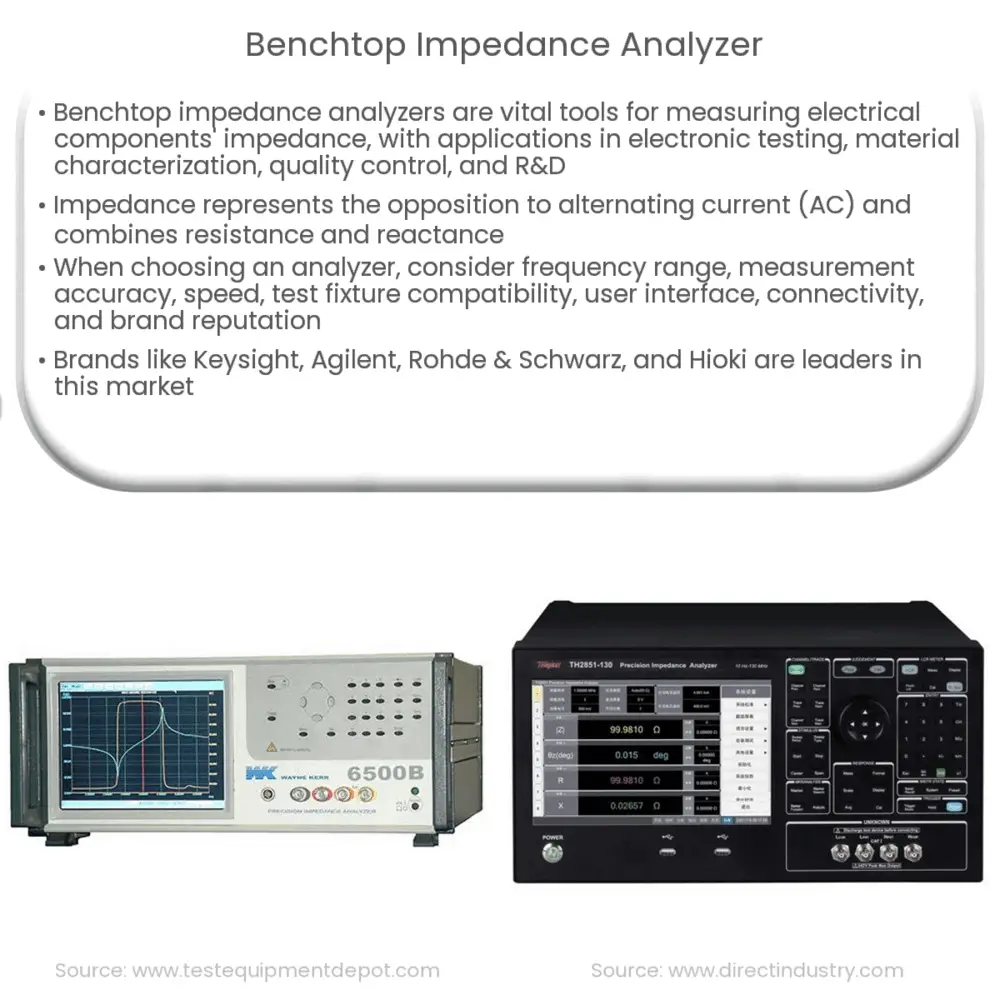Benchtop impedance analyzers accurately measure electrical components’ impedance, aiding in testing, R&D, and quality control across various industries.

Benchtop Impedance Analyzer: A Comprehensive Guide
Introduction
An essential tool for engineers, researchers, and professionals in various industries, the benchtop impedance analyzer provides accurate and reliable measurements for a wide range of electrical components. This powerful device has a prominent place in laboratories and manufacturing facilities, where it is used to test and analyze electronic components, circuits, and materials. In this article, we will explore the fundamentals of impedance analyzers, their significance, applications, and the key features to consider when selecting the right analyzer for your needs.
Understanding Impedance Analysis
Impedance is a complex quantity representing the opposition to the flow of alternating current (AC) in an electrical circuit. It is expressed in ohms (Ω) and is a combination of resistance (real part) and reactance (imaginary part). Impedance analysis involves measuring this opposition over a range of frequencies to gain insight into the electrical characteristics of a device or material.
Benchtop impedance analyzers are sophisticated instruments that measure the impedance of various electrical components, such as resistors, capacitors, inductors, and even entire circuits. These analyzers work by generating an AC signal, applying it to the component under test, and measuring the resulting current and voltage. By processing this data and calculating the impedance, the analyzer provides valuable information on the performance and behavior of the device.
Applications of Benchtop Impedance Analyzers
Benchtop impedance analyzers are versatile tools with numerous applications in different industries. Some of the most common uses include:
- Electronic Component Testing: Impedance analyzers are used to test and characterize passive electronic components, such as resistors, capacitors, and inductors, to ensure their performance meets the required specifications.
- Material Characterization: By analyzing the impedance of various materials, researchers can gain insights into their electrical properties and suitability for specific applications, such as energy storage devices, sensors, and conductive materials.
- Quality Control and Manufacturing: Impedance analyzers play a vital role in monitoring the quality of components and circuits during the manufacturing process, ensuring that the final products are consistent and reliable.
- Research and Development: In R&D environments, impedance analyzers are used to analyze the electrical characteristics of new materials, devices, and circuits, driving innovation in various fields of technology.
Key Features to Consider When Choosing a Benchtop Impedance Analyzer
Selecting the right impedance analyzer for your needs requires careful consideration of several factors. Some of the key features to evaluate include:
- Frequency Range: The frequency range of an impedance analyzer determines the range of frequencies over which it can accurately measure impedance. This range should cover the frequencies of interest for your specific application.
- Measurement Accuracy: The accuracy of an impedance analyzer is critical for obtaining reliable and precise measurements. Make sure to select an analyzer with sufficient accuracy for your requirements.
- Measurement Speed: The speed at which an impedance analyzer can perform measurements affects the overall efficiency of your testing process. A faster analyzer can save time, especially when dealing with a large number of components or frequency sweeps.
4. Test Fixture Compatibility:
Depending on your testing requirements, you may need to connect various types of test fixtures to the analyzer. Ensure that the impedance analyzer you choose is compatible with the fixtures you plan to use and can accommodate different connection types.
5. Ease of Use and Interface:
A user-friendly interface and intuitive controls are essential for efficient operation of a benchtop impedance analyzer. Look for devices with easy-to-navigate menus, clear display screens, and the ability to store and recall measurement settings.
6. Connectivity and Data Handling:
Modern impedance analyzers often offer a range of connectivity options, such as USB, Ethernet, and GPIB, to facilitate data transfer and remote control. Consider an analyzer that supports the communication protocols required for your specific setup and allows for seamless integration with other instruments and software.
7. Budget and Brand Reputation:
Lastly, consider your budget and the reputation of the manufacturer when selecting an impedance analyzer. High-quality, reliable instruments are typically more expensive, but they can save you time and money in the long run by reducing measurement errors and equipment downtime.
Popular Benchtop Impedance Analyzer Brands
Several well-known manufacturers offer benchtop impedance analyzers with various specifications and features. Some of the most popular brands in the market include:
- Keysight Technologies: Keysight offers a wide range of impedance analyzers, known for their performance and reliability, catering to a variety of applications and industries.
- Agilent Technologies: Agilent is another reputable manufacturer of impedance analyzers, offering devices with high accuracy, precision, and user-friendly interfaces.
- Rohde & Schwarz: Rohde & Schwarz provides high-quality impedance analyzers with robust designs and advanced features, making them suitable for both R&D and production environments.
- Hioki: Hioki is known for its high-performance, yet affordable, benchtop impedance analyzers, suitable for a wide range of applications.
Conclusion
Benchtop impedance analyzers are indispensable tools for engineers, researchers, and professionals across various industries. Understanding the importance and applications of these instruments, as well as the key features to consider when selecting the right analyzer, can help you make an informed decision and maximize the efficiency of your testing processes. By investing in a high-quality benchtop impedance analyzer from a reputable brand, you can ensure reliable and accurate measurements, driving innovation and success in your field.

